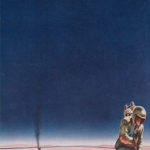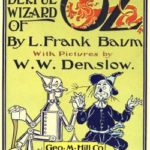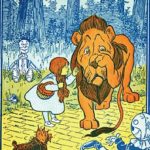From The Writers’ Toolbox: MICE In Your Story
Especially for writers who are planning to participate in NaNoWriMo this year, it might be helpful to consider something Orson Scott Card introduces in his writing books Character and Viewpoint and How to Write Science Fiction. I came upon the concept in Writing Fantasy & Science Fiction, to which Card contributed several chapters.
Here’s the key concept: “All stories contain four elements that can determine structure: Milieu, Idea, Character, and Event” (Writing Fantasy & Science Fiction, p. 77). MICE, for short.
 Milieu has to do with the story world—its physical, social, political, economic aspects.
Milieu has to do with the story world—its physical, social, political, economic aspects.
Idea refers to new bits of information that characters discover in the process of the story.
Character relates, not just to who the main player is in a story, but how he changes.
Finally, Events show what takes place to correct a wrong in the normal order of things.
All stories have all these elements, but according to Card, one of the four takes central stage. The Milieu dominates Jonathan Swift’s Gulliver’s Travels, for example. Then Idea might be considered central to Murder on the Orient Express by Agatha Christie. In Til We Have Faces by C. S. Lewis, the Character change would be the key component and in The Lion, the Witch, and the Wardrobe also by Lewis, the Events that put the world to rights, both in Narnia and in the Pevensie family, would dominate the story.
I’m intrigued by this way of looking at stories. I can see a particularly useful application because Card teaches that whatever dominant element shows itself in the beginning will also end the story. If a novel starts out as a murder mystery, for instance (Idea), but doesn’t end with the discovery of the perpetrator, readers will be frustrated no matter how well-told the story might be of the police detective’s recovery of his self-confidence (Character).
In some ways, I think this view of stories can help writers decide where their story starts and where it should end. If they begin with a character, for example, who has reached a point where he is so “unhappy, impatient, or angry in his present role that he begins the process of change” then it will end “when the character either settles into a new role (happily or not) or gives up the struggle and remains in the old role (happily or not)” (ibid., p. 81).
As you may have realized, I’m qualifying my reaction to this approach to stories. Card himself says all stories have all the MICE elements, and I agree with this point. I’m not so sure, however, that one always dominates.
As an example of Milieu, for instance, Card offers these examples:
The real story began the moment Gulliver got to the first of the book’s strange lands, and it ended when he came home. Milieu stories always follow that structure. An observer who will see things as we would see them gets to the strange place, sees all the things that are interesting, is transformed by what he sees, and then comes back a new man . . . Likewise, The Wizard of Oz doesn’t end when Dorothy kills the Wicked Witch of the West. It ends when Dorothy leaves Oz and goes home to Kansas. (Ibid., pp 77-78)
I agree with this assessment, but believe The Wizard of Oz could just as easily be used as an example of a Character story which Card says is “about the transformation of a character’s role in the communities that matter most to him” (Ibid., p. 80). Clearly, Dorothy’s role in her family is central to the story. She was unhappy in the beginning and learned by the end that there’s no place like home.
 A case might even be made that The Wizard of Oz is an Event story, starting with something wrong in the fabric of the world which needs to be set right. Dorothy’s unhappiness and determination to run away has unsettled her world; when she reaches Oz, it’s apparent that their world has been unsettled, too. As Dorothy goes about doing what she does to fix her own situation, she also puts to right what ails Oz.
A case might even be made that The Wizard of Oz is an Event story, starting with something wrong in the fabric of the world which needs to be set right. Dorothy’s unhappiness and determination to run away has unsettled her world; when she reaches Oz, it’s apparent that their world has been unsettled, too. As Dorothy goes about doing what she does to fix her own situation, she also puts to right what ails Oz.
My point is this: I tend to think that the best stories skillfully weave all the elements together so that the dominant one isn’t overpowering, and the subservient ones aren’t invisible—or worse, predictable and clichéd.
Is there any advantage in knowing what kind of story a writer is undertaking? Perhaps. If a writer isn’t sure how to end a story, then the dominant element can serve as a guide. Or the reverse. If a writer isn’t sure where to start the story, then the type of story he’s written can help him determine where the proper beginning lies.
The main take-away for me is that all four elements need to be present in a story. Whichever one turns out to be the star, the others still must be present, still must pull their weight.
What do you think? Orson Scott Card is pretty hard to argue with. Do you think he’s right that one of these four elements will dominate a story? Or do the best stories bring all elements, or most, along with nearly equal strength? Can you give an example?
– – – – –
Mouse asleep photo by alexander kokinidis from FreeImages
Featured photo by Daniel Heitz from FreeImages









































I have to agree that all four elements be given equal weight. Or at least a balance, if not equal. Examples? Um… Patrick Carr’s “The Shock of Night” Series. The story begins with the character being swept away with events that lead him to “worlds of politics and power” that he is not familiar in, nor with. He finds himself also changed, as is his world, by the end of the series. All four of the MICE end up being impacted almost equally, each growing and changing as the story is told/experienced. I find it interesting when someone puts forth a “all stories are _________” or “all stories contain_________.” It’s easy to come by examples to fit the mold, but equally easy to argue against the formula. With no disrespect to the ones putting forth the formulas. Writing is the most subjective of the arts, in my opinion. What you see isn’t what I wrote; what I wrote isn’t exactly what I meant. Trying to reduce it to a “insert ‘a’ to get ‘b’ and ‘c’ happens” happy formula that fits everyone is impossible. Novice writers will spend far too much time and effort trying to make sure they follow the current “wisdom;” experienced writer’s will go, “interesting, but I’ll write it this way anyhow.” Good food for thought, however.
Great comment, Colleen. I do think the MICE concept was good food for thought, and in many ways, it makes me want to be sure I’m bringing along all those areas as I write. But I’m with you: I don’t see writing as a formula that you simply must complete with the right pieces. It’s far more organic. And yet, we can learn from stories that are good stories. So it’s kind of a balancing act. What can I learn and how can I be my own organic writer without falling into the trap of trying to complete a formula.
Thanks for expanding this topic.
Becky
It’s good to be reminded of these four writing concepts. I hear them discussed periodically on the Writing Excuses podcasts.